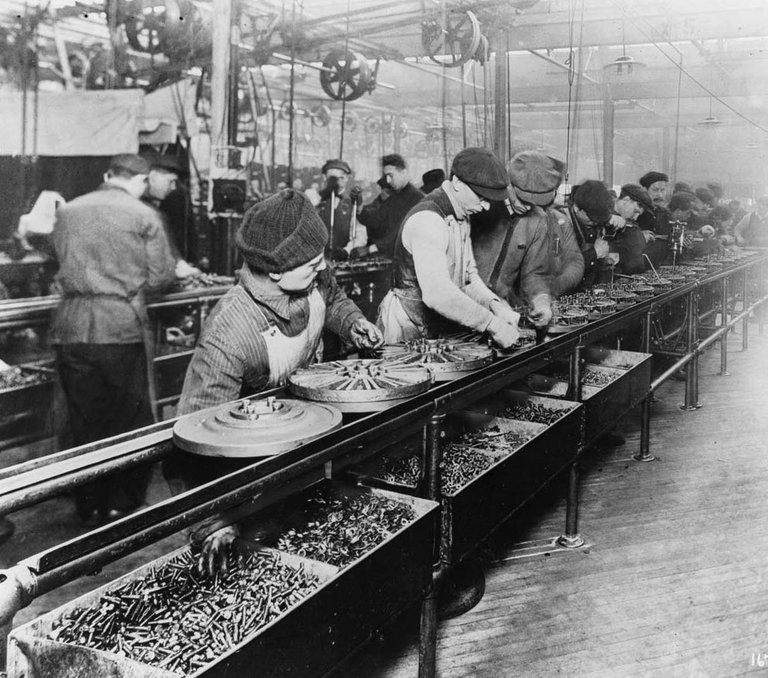A simple thought:
In a liberal system everyone tries to make it on his own and some succeed and some don’t. A natural inequality emerges. But then something wonderfull happens:
Redistribution on the workfloor.
The people who make it, will own a company that is doing well. And in these companies everyone can go to work and earn a living. The big factories and office buildings of the mid 20th century were a great example of that. Some people started successful companies, but many were able to get a well paid job in those companies. They bought a house, went on holiday, and paid for a good education for their children. The company was the big machine of redistribution of the wealth: Money went from the wealthy boss to the poor working class. This was how the middle class got big.

source: Wikipedia
But what if you have companies that don’t employ people, or very few? What if you have a company with a multimillion revenue and only 3 employees?
Do you still have a good redistribution of wealth?
Can we keep a middle class in the future?
What happens to the losers of the liberal system?
(The story of Instagram is famous for this type of company that was employ very few people: It was sold for a billion $, and at the time it had 13 employees.)
As soon as your born they make you feel small
By giving you no time instead of it all
Till the pain is so big you feel nothing at all
Working Class Hero is something to be Working Class Hero is something to be They hurt you at home and they hit you at school...
"Working Class Hero" - John Lennon
good questions @natenvos
I'll follow the comments 8]
Automation is killing the middle class slowly but surely. As more and more jobs are automated, Basic income will ultimately be the savior of our economy.
Maybe yes. But this basic income might be difficult to implement. It needs support from the people, and money to pay for it.
Y Combinator (Startup incubator in silicon valley) is dumping money into a basic income study. Check it out; http://arstechnica.com/tech-policy/2016/06/can-high-profile-bay-area-tech-incubators-basic-income-plan-work/
The study results will be used for bigger Universal Basic Income studies
Thanks for info. I will try to follow this research.
One of the biggest problems I see in the basic income is the resistance of a lot of people to the idea that a job would no longer be the center of society. And with that I mean that a job would no longer be seen as the single way to proove that you contribute to society.
We created a whole culture based on having a job, but maybe we will have to change this sooner or later.
We are creating a new culture right here on Steemit! Maybe people will blog for a living in the future.
Unrelated question, how did you get your image so large? When I paste in the image URL you used its much smaller in my preview.
Good question :-) Sadly I have no idea.
But I think it takes the size of the original picture. So I just took the URL of the original big picture.
The preview seems to always be smaller... had the same issue, and posted and it was large.
I don't think it's only about companies with 0 emplyees. Many companies have shrinking numbers of employees while they are producing more and more. Some companies are growing fast and don't hire new people. The jobs that are lost here are the jobs with their competitors going bankrupt.
And yes, we can try to bring production back from China, but I think that is only possible if the production is automated.
I would have to do more research on the finer points to give you a better response, but I will say this: getting jobs back to America may be contingent on automation, but it is first contingent on a competitive cost. If automation is cheaper, then sure, jobs will come, and if it's not, then they will stay abroad. I have been arguing for a looooong time that the problem in America is nothing other then the cost of living. People want a $15 min wage (which is crazy expensive compared to Africa for the same manufacturing labor) to try and match inflation. Why bother with automation when you can get human labor for pennies on the dollar, and pay your work force a wage which puts them in the top 10% income bracket among their peers in an underdeveloped nation? The real problem in the developed west is practical inflation and the breakdown of the present monetary system. Anyway, I hope you are heavily invested in crypto!
I see this as a bigger immediate problem than automation and technology, although that will come. In the US we have moved toward a service based economy. Many services hire few employees such as your example of Instagram.
People in the US complain about "income inequality" and point towards companies like Walmart. What they don't see or look at is companies that have few employees and enormous profits.
To clarify a bit for those that are new to STEEM I will add this detail.
When STEEM pays out 1 $ worth of rewards (whether from posting, commenting or upvoting) it simply creates the new units "out of thin air". This has the effect of diluting everyone's STEEM holdings since the supply has increased but your personal wallet's balance has not.
The way to protect yourself from this dilution is to Power Up.
What does this do you might be axkin '?
Well, for every 1 $ worth of STEEM created to pay for content & curation there are 9 $ worth of STEEM created to send to those that have powered up.
So you should only hold STEEM if you are planning on selling it, or sending it to someone. Do not hold it for a long time since it is being diluted little by little by everyday's payouts.
Power it up and you will lock in your value.
Hope this helps complement the main post!
